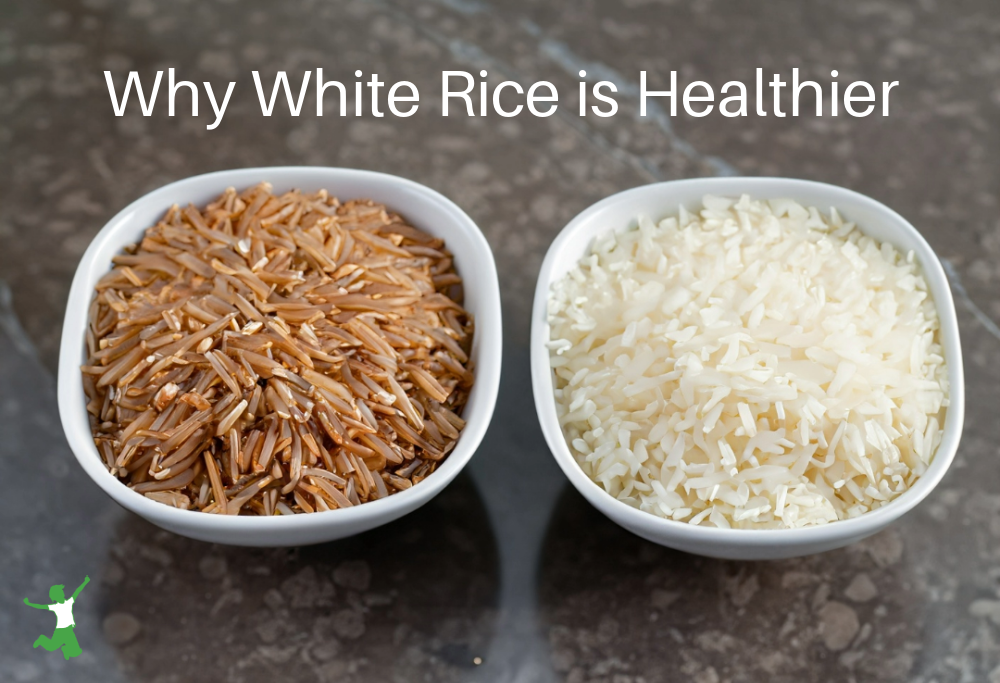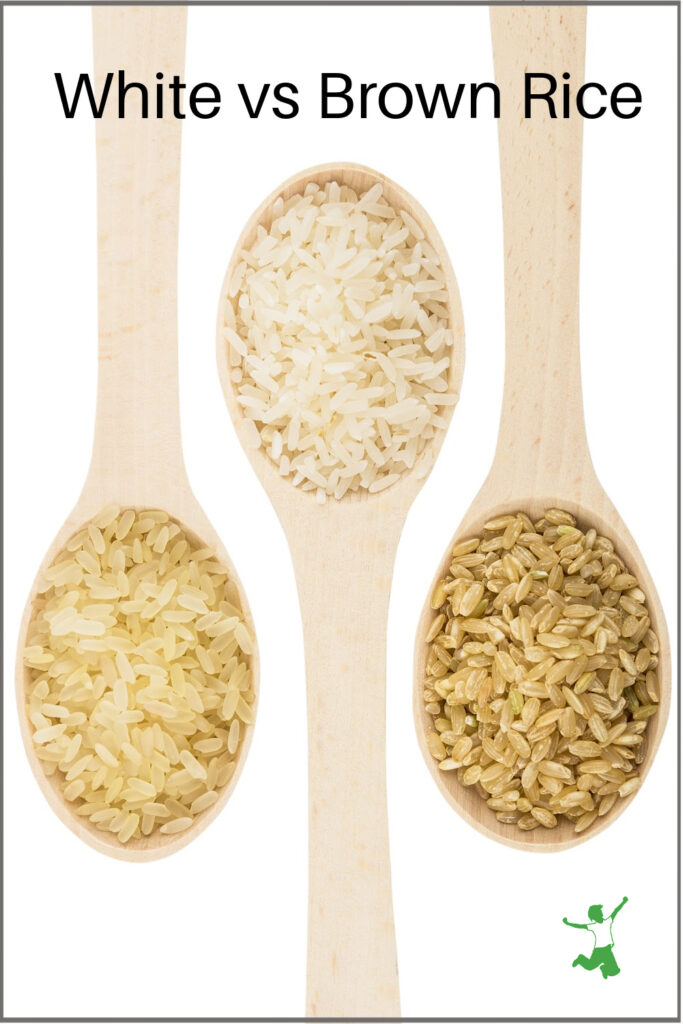The reasons white rice is healthier than brown rice as determined by research as well as which type traditional societies preferred consuming.

My article and video on healthy Chinese food drew some comments from readers who questioned my choice of rice.
Why was I using white rice vs brown? Isn’t brown rice the healthier choice, after all?
Ok, I’ll spill the beans, rice. Here are my reasons …
The truth is, neither my husband nor myself have ever enjoyed brown rice (although we love the nutty flavor and digestibility of wild rice).
Every time we eat brown, it just seems to not sit very well in our stomachs.
Even when it is sprouted or soaked before cooking, it, well, uh, sits like a brick for lack of a better word.
Why Some People Should Eat White Rice
White rice just seems to digest a whole lot better for us. That to me was reason enough to choose it over the brown rice.
We were also advised by an Ayurvedic MD back in the 1990s to stick with white basmati rice. This recommendation clinched the decision.
You are what you digest, after all – not necessarily what you eat!
End of story? Well, not quite.
Rice Fiber in Brown Harms a Compromised Gut
A few years back at the annual Wise Traditions Conference, I became familiar with a compelling book called Fiber Menace.
The author writes extensively about the dangers of a high-fiber diet as it pertains to a menu loaded with whole grains as pushed by the misguided Food Pyramid.
In other words, folks who eat a bowl of All Bran every morning to keep the bathroom visits regular are unknowingly ripping their insides to shreds.
The basic premise of Fiber Menace is that grain fiber plays a leading role in many gut-related ailments including colon cancer.
When I first learned of this information, my preference for white rice over brown rice started to make more sense.
Perhaps the brown rice didn’t digest that well because of all that fiber?
Chalk one up for the white rice.
White Rice Far Lower in Phytic Acid
A second piece of information came from author Ramiel Nagel.
In his book, Cure Tooth Decay, he writes about the devastating effects of phytic acid in the diet. Phytic acid is a very powerful antinutrient and blocker of mineral absorption in the gut.
Mr. Nagel identifies brown rice as very high in phytic acid.
What’s more, soaking brown rice does not reduce phytic acid by much at all!
Polished Rice is the Ancestral Form
Ramiel also maintains that the traditional method for preparing brown rice is never to eat it whole (with only the husk removed).
Rather, ancestral societies pounded brown rice in a mortar and pestle to polish it by removing the outer bran layer. This is the primary source of the phytic acid.
Nagel goes on to point out that experiments have shown that the milled and polished rice that results from this pounding process, has the highest mineral absorption.
In short, mineral absorption from whole brown rice is much less than white polished rice. This is because the phytic acid in the bran which is not reduced much by soaking, greatly interferes with the absorption process.
What About Arsenic?
A big issue with arsenic contamination in rice has emerged in recent years. Some folks have responded by no longer eating rice at all.
This is an overreaction, in my view.
Clean rice is definitely available if you know what to look for.
This article on how to avoid arsenic in rice details what to do. While soaking brown rice barely moves the needle on phytic acid, soaking white rice before cooking removes nearly all the arsenic!
Another option is to parboil white rice before using fresh water for a full cook if you don’t have time to soak.
Is White Rice Better Than Brown?
So it seems that brown rice is not necessarily a healthier choice than milled white rice.
Black or red rice would fall into the same category.
Obviously, whether you choose one or the other is a personal preference, but I hope this information helps you sort through the decision with a bit more clarity.
As for me and my family, we will be sticking with white basmati and jasmine rice (white basmati rice is more nutritious than plain white rice).
I currently buy this brand of rice in 25-pound bags as the most economical and high-quality choice.
Observation clued me in many years ago that brown rice was not something that was sitting well in my stomach or my husband’s.
As the years go by, more research is coming forth to indicate that this decision was the right way to go after all.
Do you eat white rice or brown rice in your home? Why or why not?

References
(1) Fiber Menace
(2) Living with Phytic Acid
More Information
Macrobiotic Diet and Extreme Vitamin D Deficiency
Tiny Teff Grains Deliver Big on Nutrition
How to Make Perfect Yellow Rice (Arroz Amarillo)
Millet: Healthy or Not?
Do Whole Grains Cause Cavities?








Oh. My. Goodness. I am SO grateful for this information. I cook brown rice, exclusively, but my husband really loves white rice. I will switch to the Basmati and quit feeling guilty. Hooray!!!
Before trying to make a difference in our eating habits-I purchased 20 bags of regular white rice-because this is what my husband really likes. I had recently purchased brown rice to try and see if we liked it. I soaked the rice overnight and put it in a soup. It turned out really nice-so once in a while I soak some for us to have for dinner-I also soak the white “not so good for you” rice. And pray that God fills in the gaps.
Personally I like the texture of brown rice more, and it seems to go through me just fine. Plus it has a far higher amount of magnesium in it (stops fine muscle movement that I have problems with) Plus I just really hate the taste of white rice.
If it ends up ripping apart my insides, at least it tasted good.
Fermented cooked brown rice is best for regular consumption. Almost totally free of phytic acid, which binds vital minerals. Has way more nutrients than white rice. Much better for you according to Traditional Chinese Medicine.
Non-fermented cooked brown rice has loads of phytic acid, and is an excellent intestinal cleanser and relieves constipation. Regular consumption is not recommended.
Non-fermented uncooked brown rice can be chewed on alone to cleanse parasites from the intestines. Never tried this, but sounds like a valid possibility.
Sprouted cooked brown rice should be consumed in moderation by certain people because of its highly cooling thermal nature.
That’s all I got for now.
Thanks for sharing. I’ve heard most rices are cooling too, but am not as well versed in fermented rice recipes. May I ask what steps are usually taken to ferment brown rice properly in traditional chinese medicine? If you know anything about the preparation and nature of oats, or other grains, I’m curious to know about that as well.
I actually got a lot of the above info wrong. No need to ferment brown rice, just soak it overnight or longer. Always toss out the soak water afterwards. There seems to be a movement online to demonize phytic acid, but the scientific literature doesn’t seem to support that, instead implicating IP6 as having anti-cancer effects. Brown rice is neutral thermally. Sprouted brown rice is not that cooling. If you are going to prepare any whole grain, soak it overnight in spring water for at least 12 h. Municipal water is loaded with chlorine/chloramine/fluoride/VOCs etc. which may be absorbed to some extent at least by the grain, so spring/filtered water is a must. Oats should ideally be bought hulless in a sealed package and then freshly rolled by you before soaking. Hope that helps.
I’m Asian and have been Paleo/Primal since July 2011. Long grain jasmine sweet (white) rice is very popular in our culture and in our neck of the woods (Texas). When I was leaning down, I avoided white rice. Now that I’m lean, I’ve added it back to my diet in moderation but I do double check my blood sugar with a glucose meter. Blood sugar 2 hours post jasmine rice + stir fry: 90. Blood sugar 2.5 hours post Tex-Mex (guiso, rice, charro beans, corn tortilla): 127.
Before Paleo/Primal, I did the All-Bran breakfast religeously and that winter (2010-2011) I suffered one of the worse bouts of chronic rhinitis and upper respiratory infection in my almost 4 decades of life. Winter 2011-2012, no issues with allergies or infection and no meds either.
Of course, YMMV and n=1. Not a fan of basmati rice but that’s a cultural preference issue. 🙂
I also thought I was doing myself a favor by eating brown rice and I really do like the taste. However, it just tears me up when I eat it. I am back to white!
BTW I love your website and all of the wonderful helpful information you post! It is such a community service. Thank you!!!
But what if someone has Type 2 Diabetes? White rice causes a blood sugar spike, no? What’s the best choice in that case? Looking for your input, please. 🙂
Best to probably not eat rice at all in that situation. If you must, then eat white rice with a very rich cream sauce which will even out the glycemic reaction considerably.